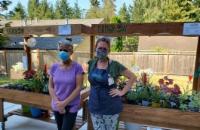By Mira Waszak, Therapy Resource, Washington
 Another gift of a grant in Washington. Pictured is Lynnwood Post Acute getting their setup and initial training.
Another gift of a grant in Washington. Pictured is Lynnwood Post Acute getting their setup and initial training.
The Eldergrow G.A.R.D.E.N Project would enable each of the nine participating Washington communities to help residents cope with this difficult time of isolation and loneliness, while also providing an interactive and meaningful activity to improve their quality of life now and long into the future.
Numerous health care studies show a positive link between gardening and healing. Contact with gardens and nature can augment a resident’s medical treatment, including mental, physical and emotional needs. Therapeutic horticulture has been proven to deliver tangible wellness benefits, including improved self-esteem, improved memory, reduced depression, improved motor skills, and increased socialization. The project goals include, but are not limited to: 1) Increasing the quality of life by improving the residents’ emotional states and 2) improving the quality of care by focusing on the six therapeutic horticulture wellness goals set forth from the American Horticultural Therapy Society. Eldergrow strives to reach an 80% resident attainment rate on both goals.
The plan to accomplish this for the nine communities will be to launch the Eldergrow G.A.R.D.E.N program as soon as possible, even if on a limited basis initially. The Eldergrow program is a well-managed, supported and respected therapeutic program offered through horticultural gardening which many residents enjoyed previously. It has been successfully used to engage residents in long-term care facilities with the best outcome of enhancing their quality of life. Eldergrow Educators use engagement and a hands-on approach, and they enable everyone in the care center — residents, staff and family, regardless of experience, physical or intellectual abilities — to participate in this program. Eldergrow enhances residents’ quality of life through therapeutic gardens physically, socially, cognitively and creatively.
